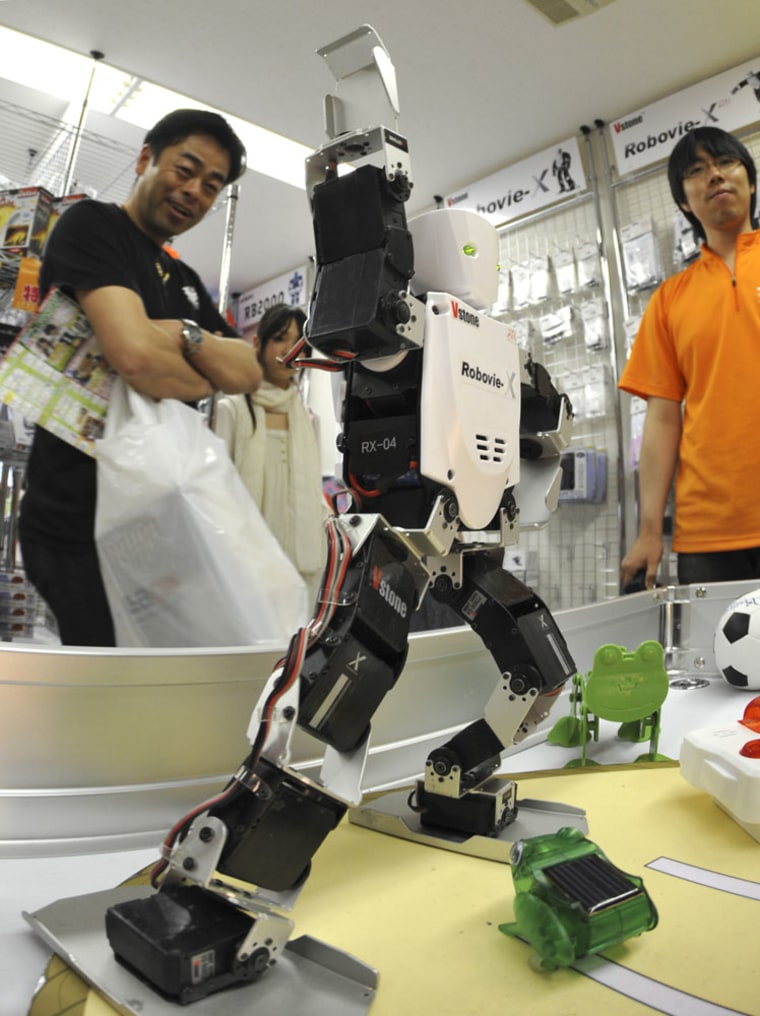Some robot-loving Japanese are tinkering with screwdrivers and motors instead of heading to the beach or hot springs during this nation's "Golden Week" holidays.
Among the robots on display Monday at Vstone Robot Center in the bustling Akihabara electronics district was the 4.3 feet-tall "Alcnon?" — a play on the Japanese for "Can it walk?" The machine shuffled about, controlled by a remote handheld device, and made jerky punches with its claw-like plastic arms.
The shop, run by Japanese robot-maker Vstone Co., on the fourth floor of a building amid the district's maze of narrow alleys and gadget stores, also offers maintenance advice for robot-owners and runs robot-building workshops for children.
Tokyo's only major store devoted to robots, it sells robots of all sizes and shapes, including not only Vstone products but also the tiny scuttling Robo-Q from Tomy Co. and the Pleo animatronic dinosaur toy from the now bankrupt Ugobe Inc. of the U.S.
"Robots highlight Japan's technological finesse," said Naoto Osada, a 30-year old teacher from Tokyo, who had just bought a Robo-Q.
The Japanese government has made nurturing robotics research one of the pillars of its growth strategy, projecting Japan's robotics business to grow to $62.6 billion by 2025, as robots become sophisticated and safe enough to enter regular homes.
During this string of national holidays, which began last week and runs through Wednesday, the center was also attracting some of the tourists who were fascinated by the dancing Tichno, which flayed its arms and leaned rhythmically from side to side.
"I love them. They are fantastic. They are very funny, especially the one who danced," said Christiane Ruff, 48, a TV studio executive from Germany, who had a stop at the robot center along with Kyoto temples during her three-week vacation.
But Nobuo Yamato, the center's chief, says Japan needs to do more to nurture future engineers if it hopes to keep its edge in robotics technology, and Vstone has been busy developing build-your-robot kits for children and high schoolers.
Helping to spread the word about robot-building and helping owners maintain robots were also reasons for setting up the center last month. Vstone estimates that some 10,000 people now own its robots in Japan.
Even Yamato acknowledged robots are mostly used as attention-getters and their long promised uses, such as caring for the elderly and handling housework, still distant dreams.
"The challenge is to deliver on the pragmatic applications for robotics, but that may take another 10 years," he said.
"Honda's Asimo robot is probably at the top of the league for Japanese robots. But all it can do is act as a receptionist and maybe serve tea," Yamato added, referring to the Japanese automaker's walking, talking humanoid.
Vstone is banking on the future with robotics kits, which come with sensors and motors, ranging in price from $60 to $100, increasingly being used in Japanese schools to make robots.
"I like robots because you can manipulate them, and they move," says 9-year-old Kazuki Azuma, whose mother had brought him to the robot center.
